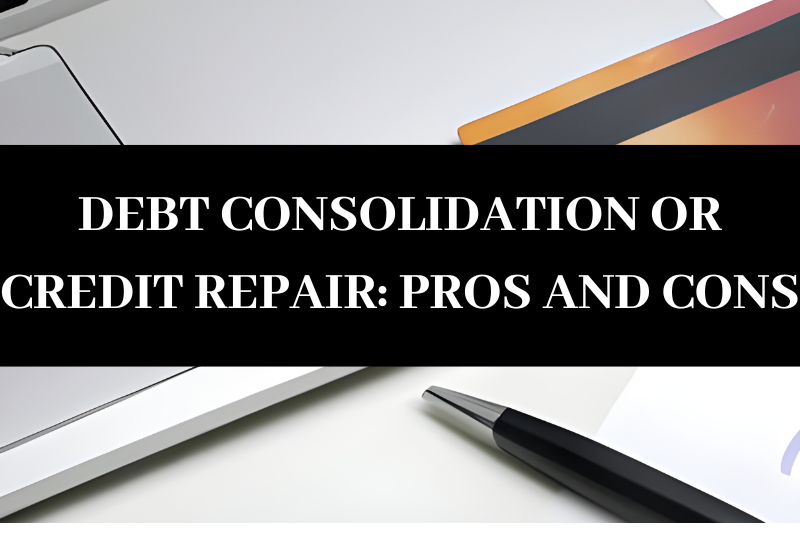Debt Consolidation vs Credit Repair: what are their Pros and Cons?
On average, an American carries a debt of about $96,371. If you’re in that situation, you might wonder what solution can help you quickly improve your credit. Two options are available – debt consolidation and credit repair services, but which is better?
When it comes to credit repair and debt consolidation, both offer promising prospects for a brighter financial future. However, choosing between the two depends on your specific circumstances and priorities.
Debt consolidation and credit repair only partially solve your financial challenges. These procedures differ significantly but can lay a strong foundation for long-term financial success if carried out correctly. This blog explores the differences and benefits to help you decide which is right for you. It will also delve into the pros and cons of each option.

Understanding Debt Consolidation
Debt consolidation aims to simplify your financial situation. It combines multiple debts into a single loan requiring a monthly payment.
Here are a few benefits of debt consolidation:
Potential Interest Rates Reduction
Consider consolidating your debt if you want to lower your overall interest rate. If there’s a steady improvement from when you took your loan, you may qualify for a consolidation loan with a reduced interest rate. The result is increased savings, especially for high-interest debts like credit cards.
Faster Payoff
If you’re struggling to pay your debts, try consolidating them. Remember, consolidation can help you obtain loans at reduced interest rates. It allows you to save on interest payments and allocate more funds to pay the principal amount. Also, making extra payments can increase debt repayment and lead to significant savings.
Simplified Repayment
With debt consolidation, you can easily streamline your finances. By combining multiple debts into a single loan monthly payment, you can avoid numerous payment deadlines from lenders.
Reduced Monthly Payments
Consolidating your debt can lead to reduced monthly payments. This can immediately make you manage your debt quickly and relieve your budget.
Improved Credit Score
Responsible debt consolidation positively impacts your credit score. You can enhance your creditworthiness by making consistent and on-time payments. Plus, you can reduce your credit utilization rate.
While debt consolidation offers many benefits, consider your financial situation and carefully evaluate the terms and conditions of any consolidation options available.
Debt Consolidation Downsides
Although debt consolidation can provide financial relief, beware of underlying risks.
Here are some drawbacks you should consider:
- Added costs: Additional fees may be charged when opting for debt consolidation. This may include balance transfer fees or origination fees. Before making a loan agreement, ensure you fully understand the associated costs.
- Higher interest rate: While consolidating your debts can be smart, your credit score may be a barrier to securing the best interest rates. In the end, you might pay more interest over the loan life.
- Increased interest payments: Even if consolidation helps reduce your interest rate, the new loan’s extended repayment period may lead to increased causing the interest to accrue. To avoid this, consider increasing your monthly payments to exceed the minimum amount.
- Risk of missed payments: Missing a debt consolidation payment can harm your credit score by subjecting you to extra fees. That’s why you must review your budget beforehand and ensure you can afford the new payment. Utilizing tools like autopay can help you avoid missing payments. Remember to communicate with your lender anytime you anticipate payment challenges.
- Underlying financial issues Remain: Debt consolidation can simplify your payments, but it rarely solves the root cause of your financial challenges. If you can’t resolve the underlying debt habits, you’ll continue accumulating more debt. So, create a healthy financial pattern to prevent this from happening.
- Potential for increased spending: Paying off debts with consolidation might make you believe you have more money. That can trigger increased spending and return to accumulating your debt. To avoid this, create a budget and monitor your spending.
Exploring Credit Repair
Now, let’s shift gears and talk about credit repair. It involves taking holistic steps to improve your credit score. It’s all about addressing negative items on your credit report.
Credit repair services can help you enhance your credit by rectifying inaccurate information in your credit reports. They will also help you track the outcomes and prevent reintroducing errors. Here are the strategies used involved in credit repair:
Disputing Errors
One of the primary strategies in credit repair is identifying and disputing inaccuracies or errors on your credit report. This involves reviewing your credit reports from major credit bureaus. That way, you can find inaccurate information and file a formal dispute with the credit agencies.
Negotiating with Creditors
Another method in credit repair involves negotiating with creditors to resolve outstanding debts. This may include working out repayment plans and settlements. Plus, negotiating to remove negative information from your credit report in exchange for payment. This lets you improve your credit standing and demonstrate responsible financial behavior.
Benefits of Credit Score Repair
Here are some benefits of credit score repair:
Improved Credit Scores
One significant benefit of credit repair is to improve your credit score. You can positively impact your credit history by addressing errors, disputing inaccuracies, and resolving outstanding debts. A higher credit score can help you obtain favorable loan terms and access to more financial opportunities.
Better Access to Credit
Credit repair can also help you gain better access to credit. When negative information is removed or corrected, lenders and creditors perceive you as a lower-risk borrower. That can lead to increased approval rates for credit applications, higher credit limits, and more favorable credit card and loan terms.
However, credit repair is a challenging fix. Patience and commitment are needed to see positive changes. Besides, while reputable credit repair services are available, it’s crucial to be aware of scams and fraudulent practices in the industry. Researching and choosing a trustworthy credit repair service is essential if you decide to go down this path.
Debt Consolidation vs Credit Repair: Pros and Cons
Debt consolidation and credit repair aim to improve your credit score and financial well-being. However, they tackle the challenge in different ways. Debt consolidation merges multiple debts into a single loan to simplify repayment. In contrast, credit repair addresses negative items on your credit report and works towards a higher credit score.
Effectiveness and Suitability
The effectiveness and suitability of debt consolidation and credit repair depend on individual circumstances. Debt consolidation can be a great option if you have multiple debts and struggle to keep track of payments. As such, you can organize your finances and save money by consolidating your debts because the interest rates are lower. However, credit repair might be more suitable, especially if your credit score is in good shape.
What to Consider When Choosing an Option
Several factors should be considered when deciding between debt consolidation and credit repair. Start by determining if consolidating your debts will alleviate your financial burden. Then assess how debt consolidation has affected your credit score. While it can provide short-term relief, there may be a temporary dip in your credit score. That’s because of opening a new credit account. On the other hand, credit repair focuses solely on improving your credit history and score, which can be beneficial if your primary concern is your creditworthiness.

Exploring Other Options for Managing Debt
If you’re exploring alternatives to debt consolidation, a few options might work for you. Depending on your circumstances, you might be eligible for debt relief programs.
One option is public service debt forgiveness. This can be a great relief, mainly if you’re dedicated to serving your community through your profession.
Another possibility is debt forgiveness, especially for military personnel. The military offers programs that help service members alleviate their debt. If you’re serving in the military, it’s worth exploring the debt forgiveness option.
However, pursuing debt relief or forgiveness has consequences, particularly for your credit score. These options are usually reserved for extreme circumstances like bankruptcy or debt settlement. While they can provide much-needed relief, they may hurt your creditworthiness.
If you’re looking for debt relief, consider consulting a financial advisor. They can help you to identify potential risks. Then, you can initiate the necessary steps to make informed decisions based on your unique financial situation.
Remember to evaluate alternatives to debt consolidation carefully. Weigh the potential benefits against the impact on your credit and overall financial well-being.
Seeking Professional Advice
Choosing between debt consolidation and credit repair can be confusing. That’s why the best approach is to seek personalized professional advice. A credit counselor can provide valuable insights tailored to your specific financial situation. These experts can evaluate your credit report, debts, and financial goals to help you make the best decisions.
Conclusion
There must be more than one answer in the debate between debt consolidation and credit repair. Both options offer potential benefits and considerations. Debt consolidation simplifies repayment and can save you money in the long run, while credit repair focuses on improving your credit history and score. The path to financial health is personal, and what works for one person may not work for another. Choose wisely and take proactive steps towards a brighter financial future.








